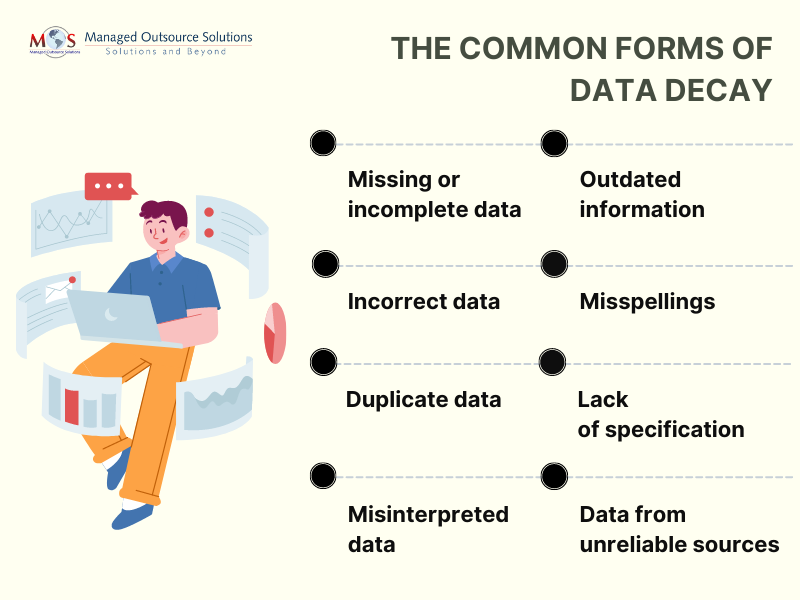Using business data effectively is key to improving efficiency and making proper decisions. Business process outsourcing solutions such as data entry, data cleansing and data conversion help organizations digitize and manage their business information. However, the quality and accuracy of digital data can erode over time. This natural phenomenon is known as data decay. Using outdated or inaccurate data to make business decisions will drastically affect a company’s performance. Understanding the factors that contribute to data decay and taking steps to manage it is critical.
What is Data Decay?
Data decay refers to any data that’s not useful or irrelevant for business decision making. Decay is inevitable for many types of data. There are two types of data decay: logical and mechanical. Logical data decay occurs when the information in your database becomes outdated. Mechanical data decay refers to a hardware failure that damages or corrupts your data or removes it completely from your database system.

Inaccurate information can result in poor decision-making, operational inefficiencies, and reduced productivity. Businesses should take steps to prevent data decay and maintain high-quality, up-to-date data.
How Data Decay Occurs
Data decay occurs when data that was once relevant becomes unusable. Data decay can occur due to various factors:
- Advancements in data storage: Data on CDs, hard disk drives, solid-state drives, and memory cards wear out over time. With the rapidly growing volume of data, conventional methods of collecting and storing data have given way to cloud storage and warehouse storage based on the Internet of Things (IoT) and artificial intelligence (AI). When data is transferred to modern computation devices and storage technologies, it can result in data corruption or loss if the migration is not properly managed.
- Hardware failure: The durability of the data stored on any drive depends on the conditions where it is stored and for how long. Hard drive failure is one of the most common reasons why data is lost or becomes corrupt. Magnetic field breakdown, environmental conditions, and mechanical failure cause degradation of data on hard drives.
- Use of outdated data measurement techniques: If obsolete techniques are used to measure data, it can lead to lead to inaccurate or incomplete data being collected and analyzed. Making decisions based on incorrect or incomplete information will have negative impacts on the business. For e.g., analyzing market trends or consumer behavior using a measurement technique that is no longer appropriate or accurate, can lead to bad business decisions and result in missed opportunities or poor performance.
- Not addressing obsolete data: Obsolete data is data that is no longer needed and has no legal validity because it has been replaced by updated information. For e.g., business data includes emails, addresses, phone numbers, business locations, and other relevant contact information. When this information becomes obsolete it is not longer relevant. Every email address that ends up being closed or unused but still remains in the business database is an example of data decay. If the company is working with such outdated information, it can lose valuable time, resources and sales.
Why Businesses Should Pay Attention to Data Decay
Poorly maintained data can affect operational efficiency and lead to many risks and damages:
- Poor business decisions: When data deteriorates, it loses its value for business decision making. Using Inaccurate and unreliable information can lead to poor decision-making, operational inefficiencies, and reduced productivity.
- Compliance issues: Using data that lacks integrity poses compliance risks and result in penalties, fines, and reputational damage. For example, data decays at high speed in a call center where phones are disconnected or reassigned at a “break-neck pace”, according to a Forbes article. If CRM data is not kept up-to-date, it can lead to Telephone Consumer Protection Act (TCPA) violations and costly litigation.
- Increased costs: The more you neglect data decay, the more you will have to spend on data cleansing services to enrich and correct obsolete information.
- Reduced customer satisfaction: Inaccuracies in customer contact details can result in delivery failures and missed communications, and when widespread can give off a poor impression. This can negatively impact customer satisfaction, loyalty, and brand reputation.
- Missed opportunities: When you’re working with obsolete data, it can jeopardize your lead generation efforts and business partnerships. Missed opportunities can result in reduced sales, revenue and market share.
5 Strategies to Prevent Data Decay
Here are 5 steps that businesses can take to combat data decay:
- Periodically update database: As discussed above, business information changes over time. Businesses should update their database regularly to ensure that their data is current. This can be done using data cleansing services or by using digital automation tools which keep data up-to-date and accurate without requiring manual intervention.
- Track data quality: Monitoring data quality using the right tools and methods is essential to keep it accurate and complete. Data quality tools come with their own capabilities and workflows and include features for profiling, cleansing, validating, and standardizing data.
- Prioritize data governance: Gartner defines data governance as “the specification of decision rights and an accountability framework to ensure the appropriate behavior in the valuation, creation, consumption and control of data and analytics”. Businesses should establish data governance policies and procedures to manage the availability, usability, integrity, and security of their data and ensure that it remains accurate and up-to-date.
- Use data analytics: Data analytics involves analyzing data sets to find trends and patterns, and draw conclusions about the information they contain. Performed using specialized systems and software, data analytics enables businesses to derive insights about areas where data may be becoming outdated and take steps to prevent it.
- Establish data quality metrics: Businesses should establish key performance indicators (KPIs) or metrics that measure the quality of data over a period of time. By implementing data quality metrics, businesses can evaluate the accuracy, completeness, consistency, timeliness, uniqueness, and validity of their data. Data quality metrics should be aligned with KPIs throughout the company.
Data decay leads to wasted resources, unreliable analytics increased costs and poor business decisions. Businesses need to focus on keeping their data clean to stay relevant with their customers and suppliers by preventing data decay. When it comes to maintaining data quality, business process outsourcing solutions can help every step of the way. Leading BPO companies offer a wide range of services – from data entry and data cleansing to document scanning and conversion using the latest technologies. Such support can go a long way in helping organizations combat data decay, save time, reduce errors, and improve the accuracy and completeness of their data.
Preserve your bottom line with quality data. Call 1-800-670-2809 to talk to our solutions manager
Save 30-40% of your operating costs with our outsourcing solutions!




